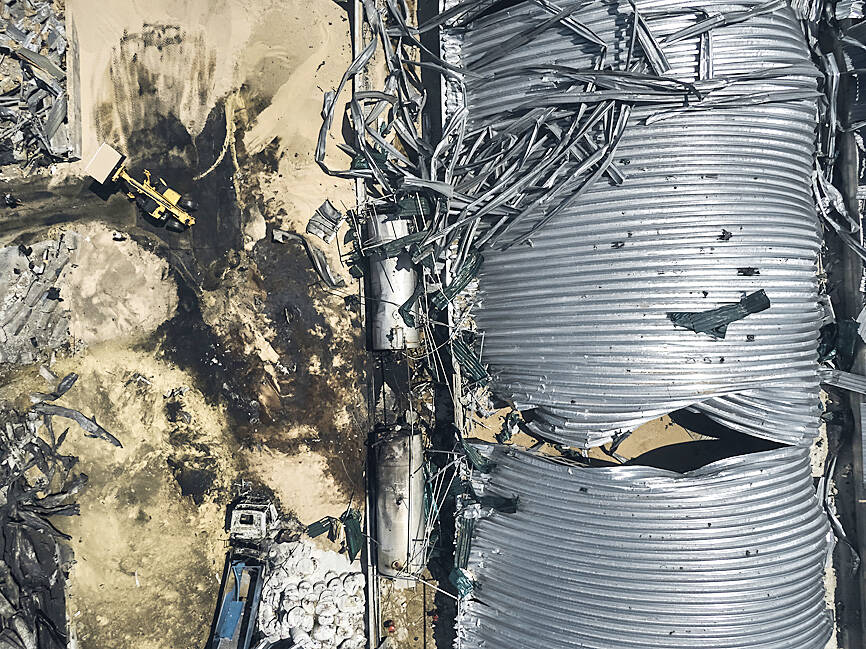A Ukrainian drone attack on Crimea yesterday blew up an ammunition depot, sparking evacuations on the Moscow-annexed peninsula and halting rail traffic, just five days after drones damaged Russia’s symbolic bridge across the Kerch Strait.
Crimea, annexed by Russia in 2014, has been targeted by Kyiv throughout Moscow’s 17-month long Ukraine offensive, but has come under more intense, increased attacks in the past few weeks.
In a counteroffensive launched to retake lands lost to Moscow, Kyiv has increasingly made clear that it aims to also take back the Black Sea peninsula.

Photo: AP
“The goal is to return Crimea,” Ukrainian President Volodymyr Zelenskiy said, according to a transcript published by his office of a speech addressing the Aspen Security Forum on Friday.
He said that Kyiv considers the Crimea bridge — opened by Russian President Vladimir Putin in 2018 — as an “enemy object” and wants it to be “neutralized.”
Less than 24 hours later, the Moscow-installed head of Crimea, Sergei Aksyonov, said an “enemy” drone had detonated an ammunition depot.
“As a result of an attack by an enemy drone on the Krasnogvardeisky District, an ammunition depot detonated,” Aksyonov said on Telegram, referring to an area that lies inland at the center of Crimea.
He did not specify exactly where it hit, but he ordered the evacuation of people living within 5km of the zone, without saying how many residents would be moved.
Aksyonov reported no casualties and said there was little damage, but unverified videos on social media showed billowing smoke rising into the air.
On Friday, Russia followed its withdrawal from a grain export deal by expanding its attacks from port infrastructure to farm storage buildings in Ukraine’s Odesa region, while also practicing a Black Sea blockade.
Other Russian missiles damaged what officials described only as an “important infrastructure facility” southwest of the port city of Odesa, in what appeared to be an effort to cripple Ukraine’s food exports.
Attacks have in recent days put Odesa in Russia’s crosshairs after Moscow abandoned a wartime deal that allowed Ukraine to send grain through the key Black Sea port.
In the attack on the storage site, two low-flying cruise missiles started a blaze, then another struck during firefighting efforts, Odesa Governor Oleh Kiper said.
The barrage injured two people, damaged equipment and destroyed 100 tonnes of peas and 20 tonnes of barley, Kiper said.
Russia and Ukraine have said they would treat ships traveling to each other’s Black Sea ports as potential military targets.
The Russian Ministry of Defense said on Friday that the navy had conducted drills that simulated action to seal off a section of the Black Sea. In the maneuvers, a missile boat fired anti-ship cruise missiles at a mock target.
The ministry also said it fired long-range sea-launched weapons on facilities “used for preparation of terror attacks against the Russian Federation involving drones,” adding that “all the designated targets have been hit.”

SECURITY: As China is ‘reshaping’ Hong Kong’s population, Taiwan must raise the eligibility threshold for applications from Hong Kongers, Chiu Chui-cheng said When Hong Kong and Macau citizens apply for residency in Taiwan, it would be under a new category that includes a “national security observation period,” Mainland Affairs Council (MAC) Minister Chiu Chui-cheng (邱垂正) said yesterday. President William Lai (賴清德) on March 13 announced 17 strategies to counter China’s aggression toward Taiwan, including incorporating national security considerations into the review process for residency applications from Hong Kong and Macau citizens. The situation in Hong Kong is constantly changing, Chiu said to media yesterday on the sidelines of the Taipei Technology Run hosted by the Taipei Neihu Technology Park Development Association. With

CARROT AND STICK: While unrelenting in its military threats, China attracted nearly 40,000 Taiwanese to over 400 business events last year Nearly 40,000 Taiwanese last year joined industry events in China, such as conferences and trade fairs, supported by the Chinese government, a study showed yesterday, as Beijing ramps up a charm offensive toward Taipei alongside military pressure. China has long taken a carrot-and-stick approach to Taiwan, threatening it with the prospect of military action while reaching out to those it believes are amenable to Beijing’s point of view. Taiwanese security officials are wary of what they see as Beijing’s influence campaigns to sway public opinion after Taipei and Beijing gradually resumed travel links halted by the COVID-19 pandemic, but the scale of

A US Marine Corps regiment equipped with Naval Strike Missiles (NSM) is set to participate in the upcoming Balikatan 25 exercise in the Luzon Strait, marking the system’s first-ever deployment in the Philippines. US and Philippine officials have separately confirmed that the Navy Marine Expeditionary Ship Interdiction System (NMESIS) — the mobile launch platform for the Naval Strike Missile — would take part in the joint exercise. The missiles are being deployed to “a strategic first island chain chokepoint” in the waters between Taiwan proper and the Philippines, US-based Naval News reported. “The Luzon Strait and Bashi Channel represent a critical access

Pope Francis is be laid to rest on Saturday after lying in state for three days in St Peter’s Basilica, where the faithful are expected to flock to pay their respects to history’s first Latin American pontiff. The cardinals met yesterday in the Vatican’s synod hall to chart the next steps before a conclave begins to choose Francis’ successor, as condolences poured in from around the world. According to current norms, the conclave must begin between May 5 and 10. The cardinals set the funeral for Saturday at 10am in St Peter’s Square, to be celebrated by the dean of the College